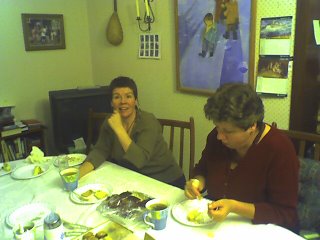Theology 101
Well, I have been thinking a lot about how and why God created us. I spoke about it on Sunday but didn't really explain myself very well. So I've been writing some stuff down and then it winds up here. (This almost feels like a journal.) It's a bit long but read it if you want. These are certainly not original ideas. I know some of them come from hearing Landa Cope and Rikk Watts recently, but how much and from where exactly, I can't really remember.
Theology 101
We have in the Old Testament revelation from God about ... His nature (who He is), man’s nature (who we are), how He wants us to live as a community (the nation Israel) and where we came from (creation). In the New Testament we have the revelation of Jesus Christ (the Word and I Am), salvation (our new nature), how to live individually (personal holiness) and the future (Revelation and the new heaven and earth).
Key principles from Genesis
1. God is
2. God created the material world by His Word
3. Man is made in God’s image
4. Sin is a reality (everything is fallen)
Values arising from those principles
1. Life is sacred (we are His image bearers)
2. The material world is good (He made it as our dwelling place - our holy of holies so to speak)
3. Words have value (because God created by speaking)
4. Anything that moves us away from God destroys us (idolatry is destructive)
5. Everything is redeemable (God is making all things new)
Each of these points can be elaborated on and I may actually do so sometime over the next while. But just to set up where I'm going with this I put down the following points.
The Purpose
We want to see Jesus lifted high. We want to see God’s Kingdom come and His will be done on earth as it is in heaven. We want to see our communities transformed. We want to see our nations be righteous, pass righteous laws and act with justice, compassion and righteousness.
The Problem
We see people get saved but they still act like the devil – or at least still acting like the culture we live in. The Church still acts like the world and still has the attitudes and characteristics of the world. That is mostly because we allow our media to disciple us. We have adopted the prevalent values of the culture instead of the counter-cultural values of the Kingdom. Although we preach salvation, we often still act selfishly, we still consume our resources on ourselves, our divorce rate is still as high as the world’s and we still live with bitterness and unforgiveness resulting in church fights and church splits. Brothers (and sisters) this ought not to be.
The Result
The world see the church with all its mistakes and problems and think they know what Jesus (and Christianity) is all about. They have not been taught about the transforming power of the Gospel throughout history. They have actually been misled because Christianity is being blamed for all the problems of the world (wars, environmental crisis, racism, hatred, intolerance, etc.). So the Church is being judged as irrelevant before it even has a chance to speak. Some people are even saying, “Christianity has had its chance but has failed. It is time to reject it and try something else.”
Our Response
The Church has become intimidated into silence and ineffectiveness by the strong media bias and the culture of humanism and political correctness. However we cannot simply respond to the immorality around us and to the accusations against us by merely getting politicians saved, by passing Christian laws or by saying “the Bible says it’s wrong.” We must be discipling individuals and discipling nations. We must be speaking truth in ways that communicate to our culture. We do that by understanding and communicating principles like the ones mentioned above. We also do that by living according to what the Spirit of God says, by the power of the Spirit and by being Jesus’ hands extended.
For example, we cannot simply say “sex before marriage is wrong.” We need to be showing that it is wrong because of how God set up the world. How would we do that? Explain that life is sacred. That means that we want to protect and sustain life. The sexual revolution has caused millions of unwanted pregnancies, abortions, rape, incest, sexually transmitted diseases (AIDS), divorce, single parents and the death or marginalization of millions of children. A recent study reported in the National Post reveals that children raised without fathers creates a remarkably higher percentage of sociopathic children than families with a father present. If we continue on this path we reveal that we do not honour life or consider it sacred. However, merely by keeping the seventh commandment (do not commit adultery) all those problems would be eliminated.
To be continued (in some shape or form).



